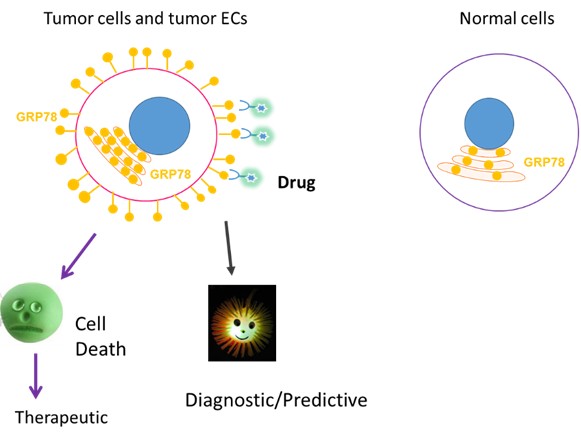Targeting cell-surface GRP78 for cancer therapy
NUS biologists have developed small peptides which are able to target cancer cells for anti-cancer therapeutics.
Cancer is characterised by uncontrollable cell proliferation and massive angiogenesis (blood vessel formation). It is an extremely diversified and complicated disease. The type of cancer and the patient suffering from it are distinct, presenting a unique set of DNA mutations, protein alterations and behaviours. Hence, it is a very difficult task to have a generic cancer drug that is effective for most cancer patients. Current anti-cancer drugs also tend to generate severe side effects in patients due to the unintended consequence of targeting cells in healthy tissues and organs. There is hence a need for novel anti-cancer drugs, which are able to specifically target tumour cells without affecting healthy cells.
GRP78 is a stress response protein residing in the cytoplasm of healthy cells. When cells are stressed (such as cells in cancer), this protein becomes overexpressed (creates too many copies of itself) and is translocated to the cell surface. Overexpression and cell-surface localisation of GRP78 is a characteristic of many human cancers at the advanced/ metastatic stages, including breast cancer, prostate cancer, colon cancer, stomach cancer, lung cancer and liver cancer. High GRP78 levels in cancer patients correlate well with aggressive cancer cell growth and resistance to chemotherapeutic drug treatments. Thus, GRP78 can serve as a biomarker to indicate the level of cancer aggressiveness, metastasis potential and drug responsiveness in patients. It is also an attractive target in the development of anti-cancer drugs (Figure 1). However, no known drugs targeting GRP78 have been developed.
Prof GE Ruowen from the Department of Biological Sciences, NUS is working on novel natural angiogenesis inhibitor proteins, to discover their biological functions for the development of anti-angiogenic cancer drugs to be used in biomedical applications.
A few years ago, Prof Ge’s research team identified a novel anti-angiogenic protein known as Isthmin (ISM). ISM binds to cell-surface GRP78 with high affinity and induces cell death (apoptosis), killing off the cancerous cells and cancer blood vessel endothelial cells. Since GRP78 is preferentially present on the surface of cancer cells and cancer blood vessel endothelial cells, ISM is able to selectively induce cell death of these cancer cells and cancer blood vessel endothelial cells, but not the healthy cells in other organs. In their experiments, they have shown that intravenous delivery of recombinant ISM protein suppressed multiple types of cancer in mice (Figure 2). This demonstrates that ISM has the potential to be developed into an effective anti-cancer drug which targets only the diseased cells.
Based on their ISM findings, the research team developed small synthetic peptides which are capable of targeting cell-surface GRP78 and suppressing cancer growth in mice. These peptides serve as biological prototypes in the development of anti-cancer drugs, and can be further chemically modified to enhance their anti-cancer activity. Based on these peptides, Prof Ge is also developing diagnostic/ prognostic imaging agents to be used in positron emission tomography (PET) scans as a companion diagnostic tool to identify patients whose cancers are suited to receive the GRP78 targeted therapy.

Figure 1 illustrates GRP78 distribution in cancer cells/cancer blood vessel endothelial cells (ECs) and healthy cells.

Figure 2 shows that ISM suppresses breast cancer growth in mice. Massive cell death is induced in cancer cells and cancer blood vessel endothelial cells. Green represents dead cells, red represents blood vessel endothelial cells while yellow indicates dead endothelial cells (both green and red).
References
1. Xiang W; Ke Z; Zhang Y; Cheng GH; Irwan ID; Sulochana KN; Potturi P; Wang Z; Yang H; Wang J; Zhuo L; Kini RM; R Ge*, “Isthmin is a novel secreted angiogenesis inhibitor that inhibits tumor growth in mice” JOURNAL OF CELLULAR AND MOLECULAR MEDICINE Volume: 15 Issue: 2 Pages: 359-374 DOI: 10.1111/j.1582-4934.2009.00961.x Published: 2011.
2. Zhang, Y; M Chen; S Venugopal; Y Zhou; W Xiang; Y-H Li; Q Lin; RM Kini; Y-S Chong; R Ge*, “Isthmin exerts pro-survival and death-promoting effect on endothelial cells through alphavbeta5 integrin depending on its physical state”CELL DEATH & DISEASE Volume: 2 Article Number: e153 DOI: 10.1038/cddis.2011.37 Published: 2011.
3. Chen M; Y Zhang; VC Yu; Y-S Chong; T Yoshioka; R Ge*, “Isthmin targets cell-surface GRP78 and triggers apoptosis via induction of mitochondrial dysfunction” CELL DEATH AND DIFFERENTIATION Volume: 21 Issue: 5 Pages: 797-810 DOI: 10.1038/cdd.2014.3 Published: 2014.
4. Ge R and M Chen. Therapeutic agents. PCT/SG2014/000062.
